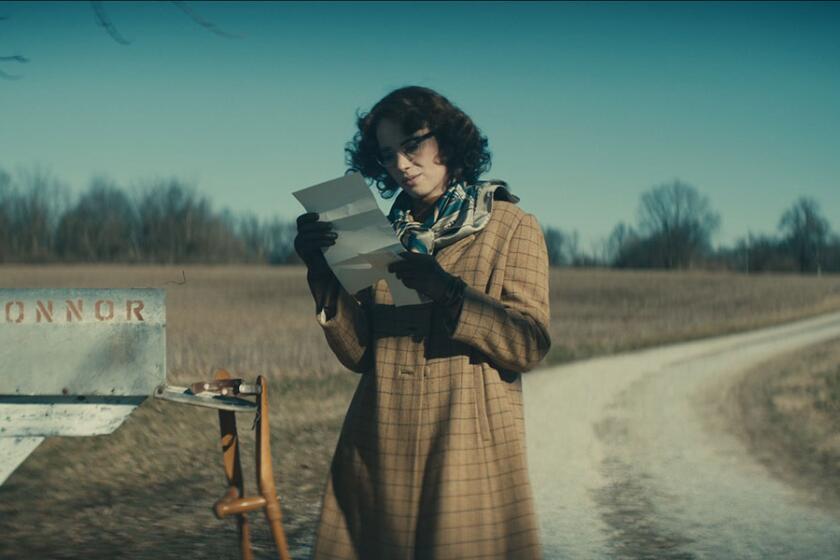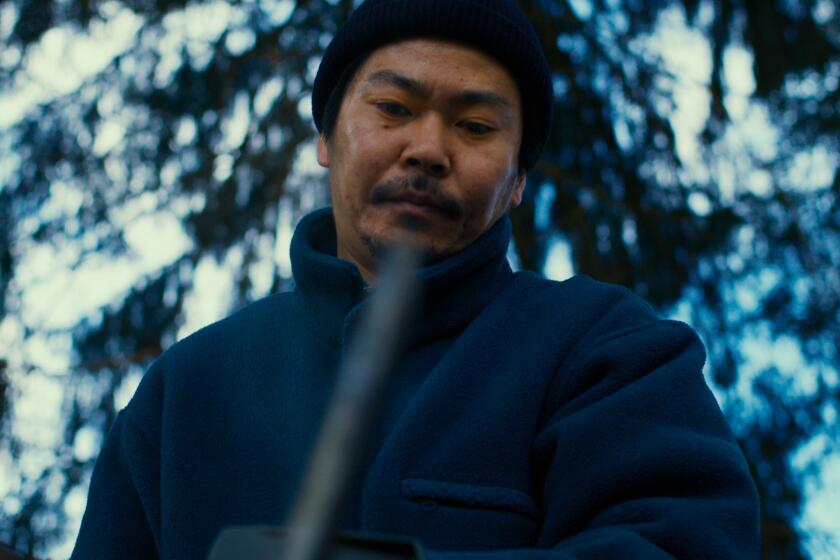Snapshot of a generation
Stepping through Dan Klores’ temporary digs is like stepping through a day-care center. He has three young kids.
Klores, arguably one of the most powerful public relations men in New York -- 110 clients, mostly corporate, though he does have a revolving door of celebrities such as Michael Jackson, James Gandolfini, Sean “Puffy” Combs -- clearly has a home life. And now, with the airing of “The Boys of 2nd Street Park” (8 p.m. Sunday on Showtime), he’s got another life. He’s become a documentary filmmaker.
“Maybe people thought, ‘Oh, this is a vanity project,’ ” Klores says in soft Brooklynese. “But the only goal I’ve ever had was to do something that was really good, not something that looked like a home movie.”
Certainly an outline of the film might suggest a home movie. “The Boys of 2nd Street Park” follows the lives of half a dozen or so of Klores’ childhood friends who bonded on a basketball court in Brighton Beach, Brooklyn, during the 1950s and then lurched through the 1960s, some landing on their feet, some not. It’s an anecdotal look at a generation, which Klores is the first to say could have been about any group of kids growing up. In a sense, what makes this film special is that the subjects are not so special and yet there’s plenty of drama: One of them is murdered, another becomes a drug addict, two of them lose children.
Klores keeps himself out of the picture -- “I didn’t want anyone saying it’s vain,” he says -- and doesn’t sentimentalize the era. There’s no blather about the Brooklyn Dodgers. Rather, it’s a story of material and spiritual impoverishment. Many of the boys’ parents were either Holocaust survivors or survivors of the Great Depression.
“We were confused kids who grew up in an environment that gave you no emotional support at home,” Klores says. “They didn’t know how to be good parents. They were afraid. They were scared of each other, they were scared of making a living, because their parents didn’t make a living. The only thing they knew was to push you to excel, and it was their definition of excel. I tried to deal with that. I was going to be the first Jewish president.”
For many of them, the ‘60s was the answer. At first the lifestyle was benign. Recreational drugs. Communal living. Trips across the country. And then for some the drugs took over. One of them, Steve Satin, lost his wife and his teeth and ended up on the streets. He is such a disturbing yet riveting figure that Klores had to edit some of him out.
In these and other decisions -- he had to pare down the 25 friends he interviewed -- Klores was aided by his partner, Ron Berger, editor Michael Levine, and a host of his “friends,” who constitute a constellation of New York celebrities and media types. Actor Peter Boyle and Jeff Lipsky, formerly of October Films, gave him notes. Jim Griffin, head of television, East Coast, at the William Morris Agency, said he could sell it to NBC. NBC President Jeff Zucker said he would have bought it (by then it had gone to Showtime, a former Klores client).
Klores insists that these people, aware of who he is and rhapsodizing about the film, were not telling him what he wanted to hear. On the other hand, he knows that who he is might prevent the film from getting a fair hearing.
“(Actress) Linda Fiorentino said to me, ‘You’re going to get resentment from other filmmakers,’ ” he says. “I feel like people are going to come after me because of who I am, who I’m supposed to be.”
Who Klores is is written all over the film. According to Brian Newmark, one of the “boys” and now a clinical psychologist, Klores got to know them as a player and as a reporter for the school newspaper.
“He was a real hothead, a smart guy, an underachiever,” Newmark says. “He was just another schlub.”
After high school, Klores spent eight years in South Carolina playing ball, chasing girls, taking drugs -- and dealing a little -- bartending, substitute teaching. He says he was every bit the mess that Satin was, only he managed to quit drugs in 1973. He became “very serious” about school, majoring in American history at the University of South Carolina, wrote a book about college basketball, and returned to New York, where he wrote “cops and robbers stuff” for New York magazine. He became press secretary for a county executive and then joined the public relations firm of Howard J. Rubenstein. He stayed there for 10 years, with a timeout when he worked for Avenue magazine.
“That was really my attempt to break out of PR,” he says. Which is what Satin, whom Klores helped get on his feet with loans and jobs and who now works as a chemical engineer, says this film is -- an attempt to break out of PR.
But for the time being, he’s still the guy who helped put Eliot Spitzer in the New York attorney general’s office and who represented Combs when he was indicted on weapons-possession charges. As “The Boys of 2nd Street Park” obliquely demonstrates, he’s got the perfect background for all of his clients -- and, perhaps, for a filmmaker.
“I can’t think of a mistake I didn’t make, a self-destructive thing I didn’t try,” Klores says. “But I think in general I’m a better person for making all of those mistakes.”
*
‘The Boys of 2nd Street Park’
Where: Showtime
When: 8 p.m. Sunday
Rating: The network has rated the documentary TV-14LD (may not be suitable for children younger than 14, with advisories for coarse language and suggestive dialogue).
Directors-producers Dan Klores and Ron Berger.
More to Read
Only good movies
Get the Indie Focus newsletter, Mark Olsen's weekly guide to the world of cinema.
You may occasionally receive promotional content from the Los Angeles Times.






